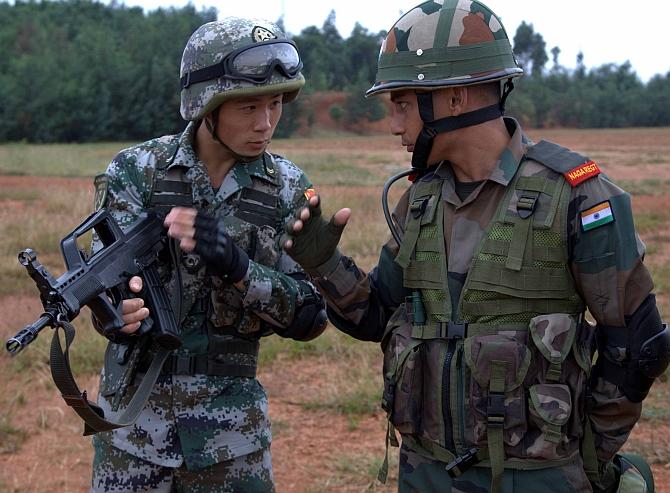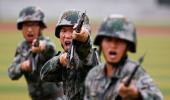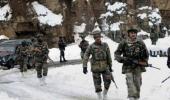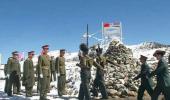China is "throwing punches" and provoking its neighbours at a time when everyone expected that it would renounce confrontation and focus on the country's economy, a top former United States diplomat on Asian affairs has said in the wake of escalating border tensions between India and China.

Twenty Indian Army personnel, including a Colonel, were killed in the clash with Chinese troops in the Galwan Valley in eastern Ladakh on Monday night, the biggest military confrontation in over five decades that has significantly escalated the already volatile border standoff between the two countries.
"China is throwing punches and provoking its neighbours at a time when you'd think Beijing would want to ease up on confrontation and focus on the economy at home. Instead, Xi Jinping is making a conscious appeal to Chinese nationalism and appears to be calculating that China can handle the consequences of these actions," Asia Society Policy Institute vice president Daniel Russel said.
China's GDP took the worst hit since the disastrous Cultural Revolution in 1976, plummeting by 6.8 per cent in the first quarter of 2020 as the country took unprecedented measures to fight the coronavirus pandemic that brought the world's second largest economy to a standstill.
China's gross domestic product stood at 20.65 trillion yuan (USD 2.91 trillion approx) in the first quarter of 2020 amid the COVID-19 impact, down 6.8 per cent year on year, according to the China's National Bureau of Statistics.
Russel was former US president Barack Obama's point person on Asian affairs, and was most recently serving as Assistant Secretary of State for East Asian and Pacific Affairs.
He was also Special Assistant to the President at the White House and National Security Council Senior Director for Asian Affairs.
UN Secretary General Antonio Guterres also expressed concern over reports of violence and deaths at the Line of Actual Control between India and China and urged both sides to exercise maximum restraint, a spokesperson for the UN Chief said.
"We are concerned about reports of violence and deaths at the Line of Actual Control between India and China and urge both sides to exercise maximum restraint. We take positive note of reports that the two countries have engaged to deescalate the situation," Associate Spokesperson for the Secretary-General Eri Kaneko said at the daily press briefing Tuesday.
Wilson Center experts have also offered their opinons on the border stand-off between China and India.
"This will likely be a watershed moment in India-China relations and the geopolitics of the Indo-Pacific. We've already seen the deadliest clash on the China-India border in over 50 years, both countries are led by men who have embraced nationalism, and both countries are facing tremendous domestic and international upheaval as a result of COVID-19 and other long-standing problems," said Abraham Denmark, Asia Program Director at the Wilson Center.
The main questions now are if either side is capable of finding an off-ramp to de-escalation, and of India's nascent friends -- such as it's Quad partners of Australia, Japan, and the United States -- will come to its aid, he said
"This isn't World War 3 by any stretch, but it is a highly volatile and dangerous situation between two nationalistic, nuclear powers at a time when American influence has badly diminished," he said.
Robert Daly, Director of the Kissinger Institute on China and the US at The Wilson Center, said neither China nor India has a vital interest at stake in Ladakh and both nations' leaders are keenly aware of the need to avoid war.
"The killings are a worrisome escalation of tensions, but little is known about the immediate causes or results of the fight in Galwan and it is not possible, at this point, to assign blame," he said.
The United States' role is to express alarm at the loss of life, monitor the situation closely, and encourage both Asian powers to stand down and manage border disputes through peaceful negotiation. If the US wishes to take further action, it should do so through the United Nations," Daly said.
Michael Kugelman, Deputy Director of the Asia Program at The Wilson Center, said what had been a slowly deescalating standoff has suddenly escalated to the "biggest crisis" India and China have confronted in decades.
"With two bitter rivals not only staring each other down on their disputed border but also reeling from a deadly encounter with mass casualties, this crisis isn't about to end anytime soon," Kugelman said.
"Conflict is unlikely, but climbing down the ladder will be neither quick nor easy. What I'll be looking for are de-escalation signals: Will the two sides return to the high-level dialogue launched earlier this month? Will government messaging be conciliatory? If the answer is no, all bets could be off and more escalation could be on the horizon," he said.
The Indian Army initially said on Tuesday that an officer and two soldiers were killed. But in a late evening statement, it revised the figure to 20 saying 17 others who "were critically injured in the line of duty and exposed to sub-zero temperatures at the standoff location succumbed to their injuries."
In Beijing, Chinese foreign ministry officials were silent on the casualties suffered by the People's Liberation Army troops, but Hu Xijin, the editor of the ruling Communist Party-run Global Times tabloid, tweeted to say that there are casualties on Chinese side too.











 © 2025
© 2025